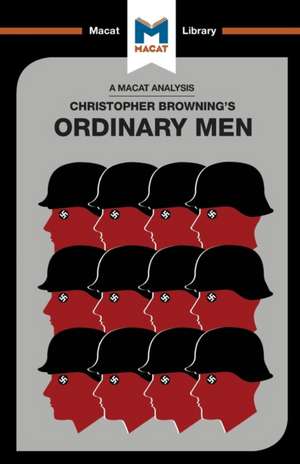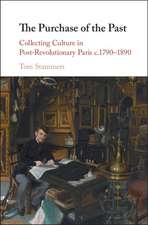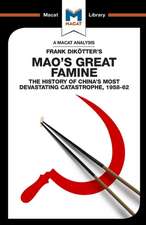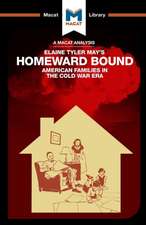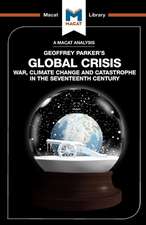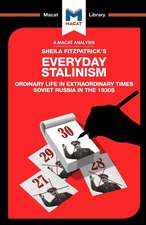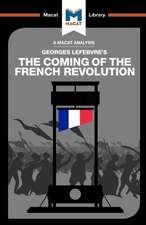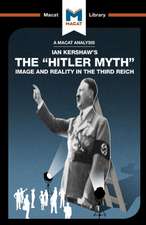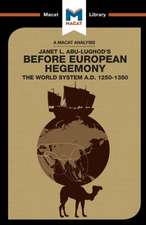An Analysis of Christopher R. Browning's Ordinary Men: Reserve Police Battalion 101 and the Final Solution in Poland: The Macat Library
Autor Tom Stammers, James Chappelen Limba Engleză Paperback – 5 iul 2017
Ordinary Men is a microhistory, the detailed study of a single unit in the Nazi killing machine. Browning evaluates a wide range of evidence to seek to explain the actions of the "ordinary men" who made up reserve Police Battalion 101, taking advantage of the wide range of resources prepared in the early 1960s for a proposed war crimes trial. He concludes that his subjects were not "evil;" rather, their actions are best explained by a desire to be part of a team, not to shirk responsibility that would otherwise fall on the shoulders of comrades, and a willingness to obey authority.
Browning's ability to explore the strengths and weaknesses of arguments – both the survivors' and other historians' – is what sets his work apart from other studies that have attempted to get to the root of the motivations for the Holocaust, and it is also what marks Ordinary Men as one of the most important works of its generation.
| Toate formatele și edițiile | Preț | Express |
|---|---|---|
| Paperback (1) | 32.99 lei 3-5 săpt. | +3.00 lei 4-10 zile |
| Macat Library – 5 iul 2017 | 32.99 lei 3-5 săpt. | +3.00 lei 4-10 zile |
| Hardback (1) | 127.98 lei 6-8 săpt. | |
| Macat Library – 15 iul 2017 | 127.98 lei 6-8 săpt. |
Din seria The Macat Library
-
 Preț: 47.21 lei
Preț: 47.21 lei -
 Preț: 47.49 lei
Preț: 47.49 lei -
 Preț: 48.22 lei
Preț: 48.22 lei -
 Preț: 49.34 lei
Preț: 49.34 lei -
 Preț: 47.42 lei
Preț: 47.42 lei -
 Preț: 47.20 lei
Preț: 47.20 lei -
 Preț: 46.98 lei
Preț: 46.98 lei -
 Preț: 47.37 lei
Preț: 47.37 lei -
 Preț: 48.33 lei
Preț: 48.33 lei -
 Preț: 47.30 lei
Preț: 47.30 lei -
 Preț: 47.23 lei
Preț: 47.23 lei -
 Preț: 64.87 lei
Preț: 64.87 lei -
 Preț: 47.30 lei
Preț: 47.30 lei -
 Preț: 47.23 lei
Preț: 47.23 lei -
 Preț: 47.20 lei
Preț: 47.20 lei -
 Preț: 47.42 lei
Preț: 47.42 lei -
 Preț: 47.30 lei
Preț: 47.30 lei -
 Preț: 47.26 lei
Preț: 47.26 lei -
 Preț: 47.65 lei
Preț: 47.65 lei -
 Preț: 47.37 lei
Preț: 47.37 lei -
 Preț: 47.08 lei
Preț: 47.08 lei -
 Preț: 47.18 lei
Preț: 47.18 lei -
 Preț: 47.30 lei
Preț: 47.30 lei -
 Preț: 47.27 lei
Preț: 47.27 lei -
 Preț: 47.99 lei
Preț: 47.99 lei -
 Preț: 47.23 lei
Preț: 47.23 lei -
 Preț: 47.02 lei
Preț: 47.02 lei -
 Preț: 47.23 lei
Preț: 47.23 lei -
 Preț: 47.40 lei
Preț: 47.40 lei -
 Preț: 48.22 lei
Preț: 48.22 lei -
 Preț: 47.42 lei
Preț: 47.42 lei -
 Preț: 47.10 lei
Preț: 47.10 lei -
 Preț: 47.40 lei
Preț: 47.40 lei -
 Preț: 46.98 lei
Preț: 46.98 lei -
 Preț: 47.18 lei
Preț: 47.18 lei -
 Preț: 47.30 lei
Preț: 47.30 lei -
 Preț: 47.15 lei
Preț: 47.15 lei -
 Preț: 47.29 lei
Preț: 47.29 lei -
 Preț: 64.24 lei
Preț: 64.24 lei -
 Preț: 46.98 lei
Preț: 46.98 lei -
 Preț: 47.33 lei
Preț: 47.33 lei -
 Preț: 47.87 lei
Preț: 47.87 lei -
 Preț: 47.42 lei
Preț: 47.42 lei -
 Preț: 50.37 lei
Preț: 50.37 lei -
 Preț: 47.13 lei
Preț: 47.13 lei -
 Preț: 47.40 lei
Preț: 47.40 lei -
 Preț: 46.98 lei
Preț: 46.98 lei -
 Preț: 47.20 lei
Preț: 47.20 lei -
 Preț: 47.21 lei
Preț: 47.21 lei
Preț: 32.99 lei
Preț vechi: 47.13 lei
-30% Nou
Puncte Express: 49
Preț estimativ în valută:
6.31€ • 6.51$ • 5.33£
6.31€ • 6.51$ • 5.33£
Carte disponibilă
Livrare economică 10-24 februarie
Livrare express 24-30 ianuarie pentru 12.99 lei
Preluare comenzi: 021 569.72.76
Specificații
ISBN-13: 9781912127474
ISBN-10: 1912127474
Pagini: 98
Dimensiuni: 129 x 198 x 7 mm
Greutate: 0.1 kg
Ediția:1
Editura: Macat Library
Colecția Macat Library
Seria The Macat Library
ISBN-10: 1912127474
Pagini: 98
Dimensiuni: 129 x 198 x 7 mm
Greutate: 0.1 kg
Ediția:1
Editura: Macat Library
Colecția Macat Library
Seria The Macat Library
Cuprins
Ways in to the Text Who was Christopher R. Browning? What does Ordinary Men: Reserve Police Batallion 101 and the Final Solution in Poland Say? Why does Ordinary Men: Reserve Police Batallion 101 and the Final Solution in Poland Matter? Section 1: Influences Module 1: The Author and the Historical Context Module 2: Academic Context Module 3: The Problem Module 4: The Author's Contribution Section 2: Ideas Module 5: Main Ideas Module 6: Secondary Ideas Module 7: Achievement Module 8: Place in the Author's Work Section 3: Impact Module 9: The First Responses Module 10: The Evolving Debate Module 11: Impact and Influence Today Module 12: Where Next? Glossary of Terms People Mentioned in the Text Works Cited
Notă biografică
Dr James Chappel completed his PhD in Modern History at Columbia University and is currently teaching at Duke University. His work focuses on the intellectual, political and Religious History of Modern Europe.
Dr Thomas Stammers is lecturer in Modern European history at Durham University, where he specialises in the Cultural History of France in the age of revolution. He is the author of Collection, Recollection, Revolution: Scavenging the Past in Nineteenth-Century Paris. Dr Stammers’s research interests include a wide range of historiographical and theoretical controversies related to eighteenth and nineteenth-century Europe.
Dr Thomas Stammers is lecturer in Modern European history at Durham University, where he specialises in the Cultural History of France in the age of revolution. He is the author of Collection, Recollection, Revolution: Scavenging the Past in Nineteenth-Century Paris. Dr Stammers’s research interests include a wide range of historiographical and theoretical controversies related to eighteenth and nineteenth-century Europe.
Descriere
Before Browning's 1992 book, most Holocaust scholarship focused either on the experience of the victims or on the Nazi political ideology driving the slaughter. Browning investigates something else: the men who carried out acts of extreme violence. Who were they? How could they end up committing such unspeakable acts?
